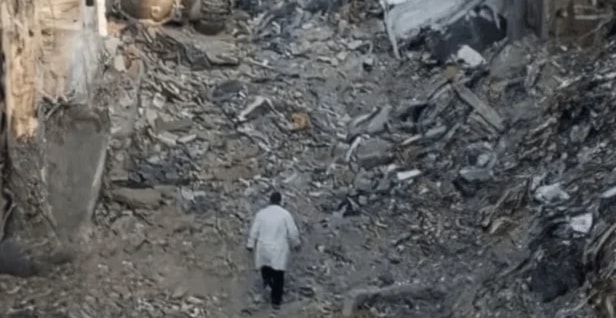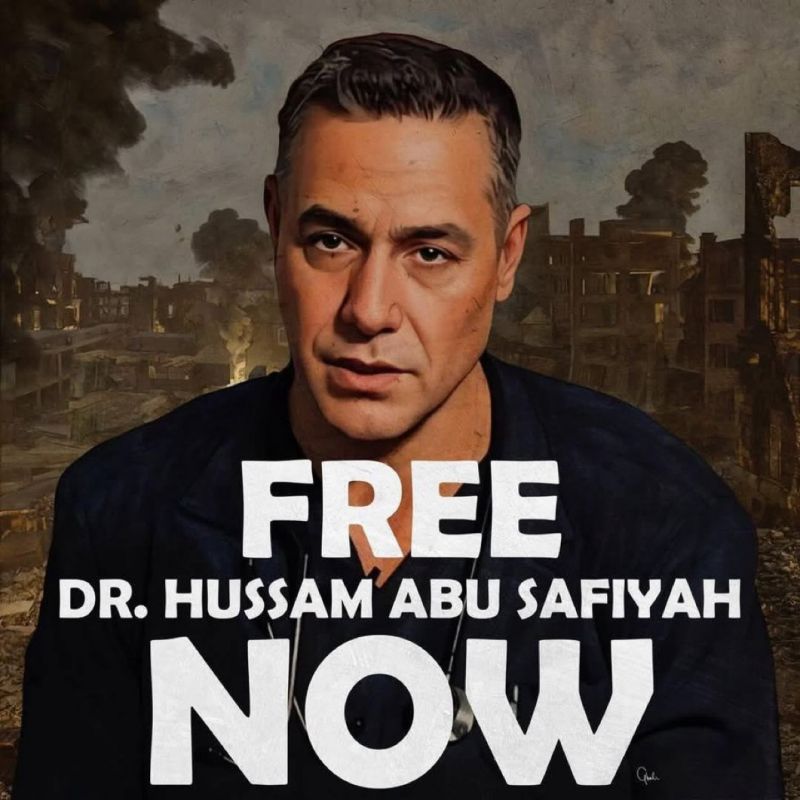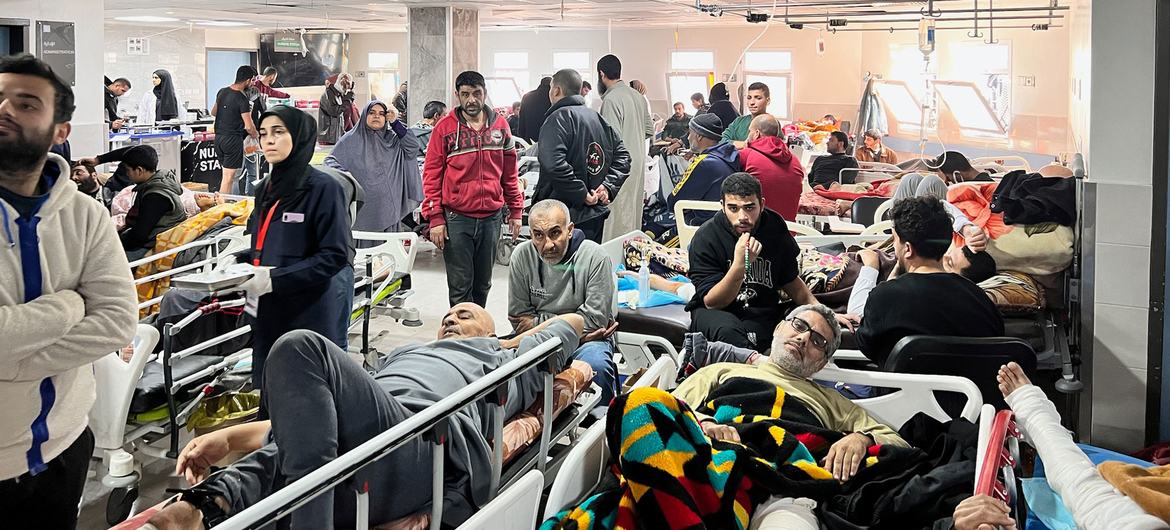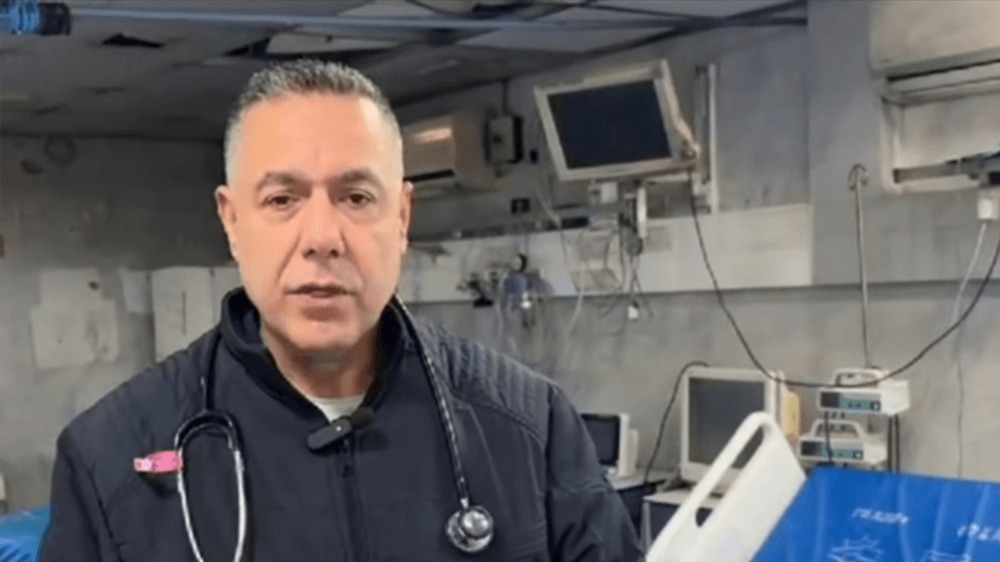Dr. Hussam Abu Safiya, Pediatrician and director of Kamal Adwan Hospital, has been held for seven months after his illegal arrest on Dec. 27, 2024. He remains held without charge at Ofer Prison, near Ramallah in the occupied West Bank.
Military’s Unsubstantiated Claims
At the time of his arrest, the Israeli military accused Abu Safiya of being a “suspected Hamas terrorist operative” and claimed Kamal Adwan Hospital was used by Hamas as a “command and control center.” No evidence was provided to back those assertions.
Colleagues fear he may suffer the same fate as Dr. Adnan al-Bursh, an orthopedic surgeon who treated the wounded during Israeli airstrikes. Al-Bursh was arrested in December 2023, imprisoned and died in April 2024 after being brutally raped in custody by Israeli guards.
Family’s Plea For Release

Abu Safiya’s family, who hold Kazakhstan citizenship, appealed for his release in a statement shortly after his forced disappearance:
“Dr. Hussam Abu Safiya, who has made great efforts to protect the health system in northern Gaza, is now facing an uncertain fate after he was forcibly disappeared by Israeli forces,” the family said.
He did everything he could to serve patients during the 84-day siege, amid hunger, oppression, bombardment and threats. Tragically, he lost his beloved son, Ibrahim, and he himself suffered severe injuries. We do not know his fate. We appeal to you to take action, raise awareness, exert media pressure and produce reports to pressure the occupation for his immediate release.
They called on the Kazakh government, the World Health Organization, MedGlobal and other foreign governments to intervene.
Prison Conditions and Abuse
According to his lawyer, Ghaid Kassem, Abu Safiya has endured repeated beatings, prolonged solitary confinement and medical neglect since his arrest in Gaza. “At the time of his arrest, he weighed around 97 kilograms,” she said. “In just the first two months, he lost about 20 kilograms. By my most recent visit, it was clear he had lost close to 40.”
Video footage obtained after the raid shows Abu Safiya being led into a military vehicle under Israeli soldiers’ orders. Israeli authorities initially denied his arrest for a week before confirming he was in custody. Seven months later, they have still presented no proof of any terrorist activity.
Abu Safiya spent nearly a month in solitary confinement at Ofer before transfer to an underground cellblock housing other Gaza detainees. Lawyer Kassem said, “The dampness is so intense that detainees feel cold even when the outside temperature exceeds 30 degrees Celsius. Hygiene is dire, with soap often unavailable and clothes washed only once every six to eight weeks. Blankets and covers are laundered every six months, she added, leading to outbreaks of scabies.”
Prison food, she noted, is “the bare minimum: they are being deliberately starved.” Detainees are totally cut off from the outside world; Abu Safiya did not learn that Israel and Iran were at war for 12 days until months later.
He has also been beaten without cause. His lawyer recounted a June 24 assault that left bruises on his head, neck and chest. Despite reporting chest pain, guards refused medical care. “This was maybe the fifth or sixth time he had been attacked and they also broke his glasses.” Kassem continued. “I tried so hard to get him a new pair [after he was arrested without them] and finally managed in May. But when they beat him again, they shattered the lenses.” Underscoring how even basic necessities are denied.
Legal limbo

Legally, Abu Safiya is held under the Incarceration of Unlawful Combatants Law (2002), which allows administrative detention without charge or trial if there are “reasonable grounds” to suspect someone of hostile activity. Israeli human rights group HaMoked reports about 2,500 Gaza Palestinians are detained under this law, which bars lawyer access for 90 days and allows indefinite six-month renewals.
Kassem went on to explain,
Mere suspicion is enough to imprison someone for years. The courts are kangaroo courts. Detainees don’t even appear in court; they are called by phone and told their detention is extended.
She believes Abu Safiya’s swift classification as an unlawful combatant came only after authorities failed to extract a confession. They may be holding him as a “bargaining chip,” suggesting release is unlikely before the war ends.
Despite this, she says, Abu Safiya “remains an optimistic person, always with high spirits and confident that the genocide will come to an end.”
His son, Elias, 28, told +972 Magazine from Gaza that most information about his father’s health has come through lawyers or unofficial sources. “He is subjected to inhumane treatment, deprived of proper food, kept in a place with no light and constantly interrogated,” Elias said. A fellow physician, he expressed disbelief that his father would be considered a security threat when he merely provided medical and administrative services.
He has no political affiliations, Elias said. His arrest results from his public appeals to stop attacks on hospitals and Gaza’s health care system.
A Broader Assault on Gaza’s Health System
Indeed, Abu Safiya’s case is part of a broader assault on Gaza’s medical infrastructure. A UN report in April documented more than 1,450 attacks on health workers, patients, hospitals and medical facilities since Oct. 7, 2023 and noted the detention of hundreds of medical personnel.
His wife, Albina, said doctors released from detention recounted beatings and torture. “My children try to shield me from details about his health, fearing I might be overcome with sadness,” she said. “I believe the army holds a grudge against him because of his dedication to his work. We want him back so we can continue our lives.”

A Call to Conscience
Imagine, for a moment, a foreign military entering a Chicago emergency room and detaining health care workers. Outrage and global condemnation would follow. Marches, vigils and protests demanding their release. Under international law, targeting medical professionals is a war crime. Yet, seven months after his arrest, Dr. Hussam Abu Safiya remains in Israeli custody, his fate unknown.
How much longer will the world allow doctors to be treated as enemy combatants and hospitals to become battlegrounds? In Gaza, the story is chillingly familiar. As the international community watches in silence, medical professionals like Dr. Hussam Abu Safiya pay the price for merely upholding their oath to save lives. His continued detention without charge, evidence or recourse speaks to a broader erosion of the principles meant to protect those who heal amid conflict.
Yet, hope endures in the courage of families, colleagues and advocates who refuse to let his disappearance be forgotten. Each appeal, each report and each moment of public scrutiny chips away at the walls of indifference. If the world truly values the sanctity of human life, it must act now. Demanding accountability, upholding international law and ensuring that no doctor, nurse or hospital is ever again used as collateral in a war.
Each day that passes without accountability only deepens the wound inflicted upon the very institutions meant to protect us all. When a surgeon’s scalpel is mistaken for a weapon and an operating room is torn apart by conflict, humanity itself is at stake.
Yet change is still within our grasp, if we dare to demand it. Through sustained advocacy, unflinching reporting and diplomatic pressure, we can reaffirm that medical neutrality is not negotiable. The courage of those raising their voices for Dr. Hussam Abu Safiya and every frontline healer unjustly detained must force us to act. By shielding hospitals and those who work within them from the ravages of conflict, we uphold the very principles that bind our shared humanity.





